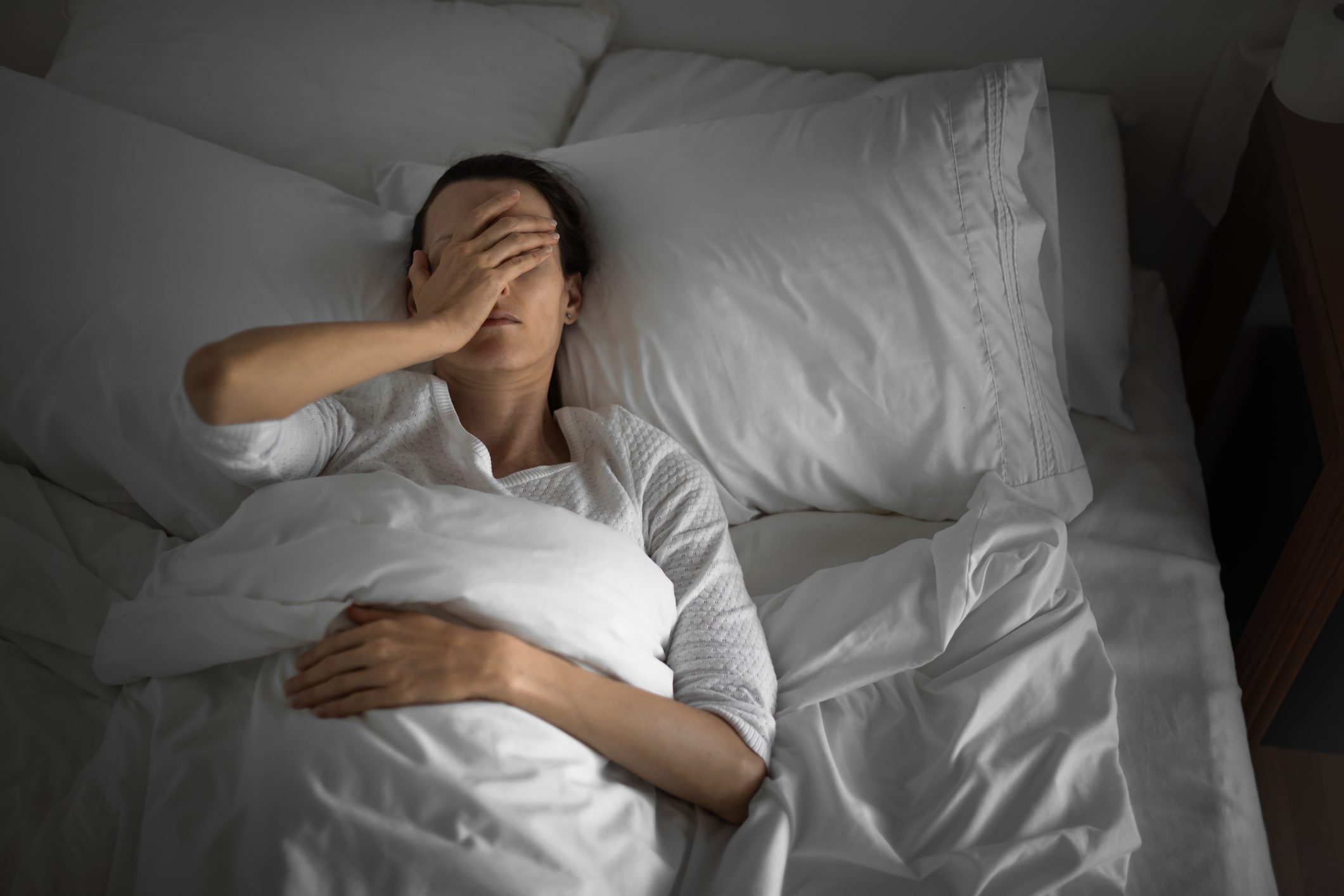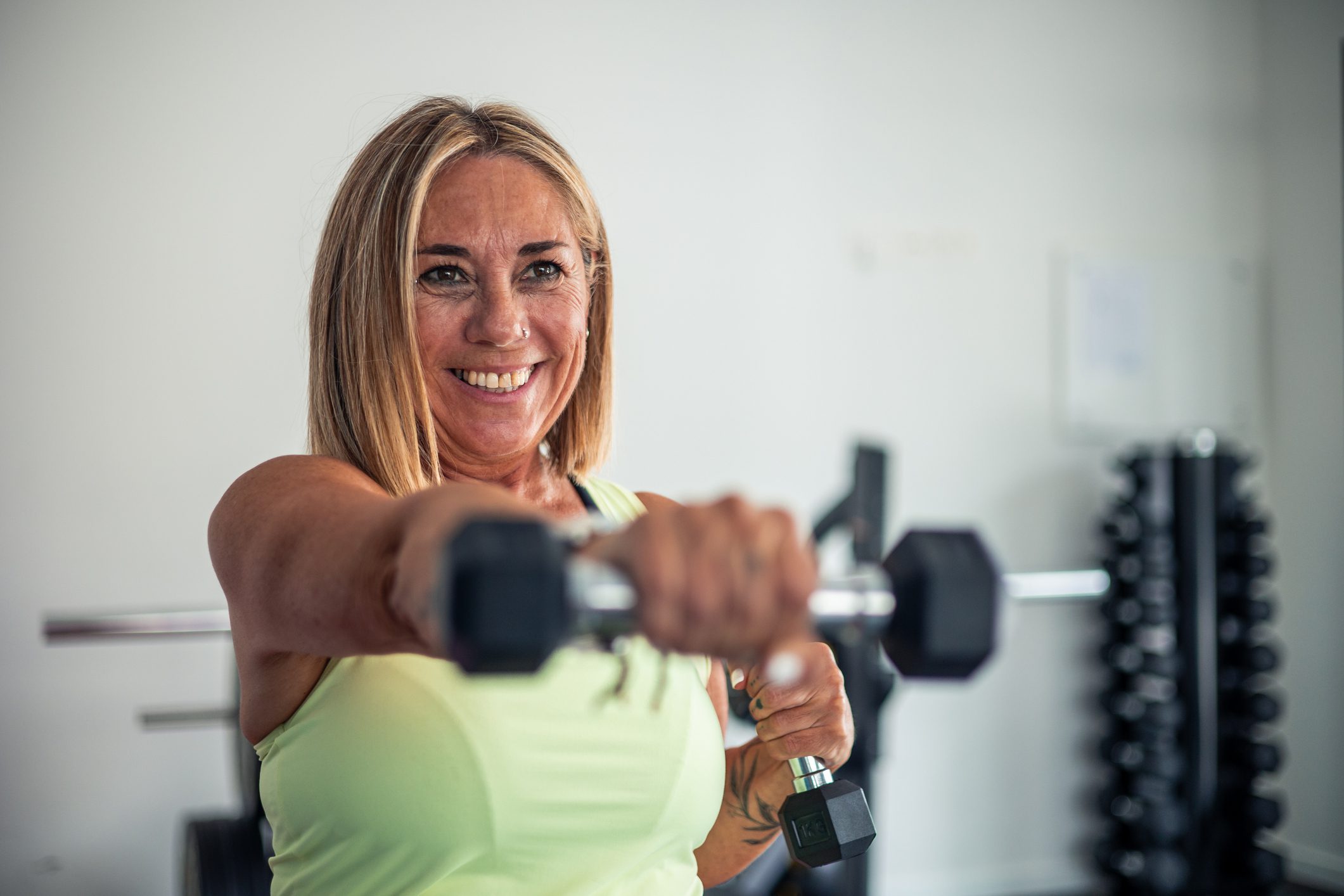
Published on Mar 14, 2023
Last modified on May 21, 2025
Trouble Sleeping During Menopause? These Natural Sleep Aids May Help.
4 min read
Sleep problems — i.e. difficulty falling asleep and staying asleep, waking up too early, suffering from sleep apnea (abnormal breathing, specifically extended pauses in breath) — are common perimenopausal and menopausal symptoms. In fact, 40-60% of postmenopausal women experience insomnia and 20% of women develop sleep apnea at some point during the menopausal transition.
Why? Well, hormonally-speaking, we’re dealing with fluctuations in estrogen, progesterone, serotonin, cortisol, and melatonin during this time.
- Decreased melatonin: Our bodies use this natural hormone to regulate the circadian sleep-wake cycle. When melatonin levels decrease with aging, it affects the regulation of our internal clocks.
- Increased cortisol: Cortisol is a key stress hormone, and when levels increase due to aging and stress, it can prevent quality sleep.
- Decreased serotonin: When we age, the number of receptors for our “happy hormone,” our bodies use as a mood stabilizer, decreases, which may be a risk factor for anxiety and depression (both of which inhibit sleep).
- Decreased estrogen: Estrogen works behind the scenes to decrease sleep latency (aka the amount of time it takes to fall asleep) and the number of times you wake up throughout the night — in addition to increasing total sleep time.
- Decreased progesterone: In early perimenopause, progesterone drops even faster than estrogen does and, due to its relaxing functions, can lead to disrupted sleep, especially sleep fragmentation. Fluctuating hormone levels, in turn, cause things like hot flashes, night sweats, depression, anxiety, and stress, which also impact sleep.
We can’t chock ALL those 3AM sleep disturbances up to menopause-related hormonal changes, though — there are so many other factors that come into play: aging, stress, diet, behaviors. The causes of lack of sleep and poor quality sleep are as diverse as the implications…it impacts everything from weight gain to health conditions like diabetes to memory to sex drive…you name it.
Better sleep = fewer symptoms and poor sleep = worse symptoms…which, we know, totally sounds like a lose-lose situation. But it doesn’t have to be — and there are natural, over-the-counter sleep aids that may help you get better quality, restful sleep (and an improved quality of life as a result).
As always, we’re not paid to feature any of these products. We’ve just vetted ‘em, love ‘em, and think you will too.
1. Ashwagandha
Ashwagandha is an adaptogen, which encompasses a group of herbs that have been used in Ayurveda (traditional Indian medicine) for thousands of years. It’s derived from the roots and berries of a small evergreen shrub and helps manage levels of the key stress hormone, cortisol, which interferes with melatonin production.
Our recommendation: Gaia Herbs
2. Vitamin B6
B6, which is one of eight B vitamins, has been shown to boost serotonin levels and, as a result, help minimize hot flashes and night sweats, which themselves can lead to disrupted sleep and next-day drowsiness.
Our recommendation: NatureMade
3. Cannabidiol (CBD)
There is a growing and promising body of research specifically looking at CBD use and sleep, and there are some companies that are incorporating CBD into their sleep supplement formulations.
It’s important to note that CBD research so far has focused on seizure disorders and anxiety. While additional benefits seem promising, we simply don’t know the specific risks and benefits, or even what is considered to be appropriate dosing. Lots of companies use it in their supplements and the amounts usually used are considered to have a low chance of side effects, but some CBD products may contain small amounts of THC (the ingredient that gives the “high”).
If you want to try CBD to help get enough sleep and boost sleep quality, doing your research is of the utmost importance. For more information, check out this article from Harvard Health.
Our recommendation: Proper
4. L-theanine
Commonly found in green and black tea leaves, L-theanine is an amino acid that has been studied for its anxiety and stress-reducing properties.
Our recommendation: Pure Encapsulations
5. Magnesium
This mineral, which is found on earth and in the human body, plays a role in over 300 biochemical reactions…sleep included. It’s found naturally in foods like leafy greens, salmon, nuts, seeds, and legumes, but many Americans don’t get enough through dietary sources.
Note: The most common side effect is upset stomach, which can be prevented by taking magnesium glycinate or magnesium L-threonate.
Our recommendation: Bonafide
6. GABA
Short for Gamma-Aminobutyric acid, GABA is an amino acid that, as a neurotransmitter, helps block certain brain signals and decrease activity in our nervous system.
Our recommendation: Mello from Ned (combination of magnesium, L-theanine, and GABA)
7. Melatonin
This hormone helps regulate our sleep-wake cycles, or circadian rhythms, by shortening the amount of time it takes to fall asleep, improving overall sleep duration, and increasing the time spent in REM sleep. Small amounts of melatonin are found in fruits, nuts, olive oil, and wine but some opt for melatonin supplements to help reset their circadian rhythm.
Our recommendation: Proper
8. Valerian root, hops & lemon balm
Valerian root is an ancient herb whose roots have been studied for centuries to promote sleep; hops (as in beer hops) are a type of flowering plant; and lemon balm is a perennial herb from the mint family. All three have been shown in studies to aid relaxation and sleep, which is why they’re often combined in supplements and teas.
READ MORE: SeXXX and ZZZs in the bedroom

Not all supplements are made equal
The Food and Drug Administration (FDA) does not (we repeat, does NOT) verify that supplements contain what they say they do or whether they’re contaminated with heavy metals, bacteria, or pesticides. It’s therefore up to consumers to practice vigilance. However, the FDA has established something called “Good Manufacturing Practices” (GMPs) that some companies abide by to ensure the identity, purity, strength, and composition of their product. If a supplement company is GMP-compliant, the FDA will periodically inspect the facility to ensure that it meets its high standards.
Outside of the FDA, there are several independent organizations that offer quality testing and seals of approval indicating that the product was responsibly manufactured, contains the ingredients listed on the label, and does not contain harmful levels of contaminants.
Three of the most well-known organizations include:
What these seals do not guarantee, however, is that the product is effective. That’s why it’s so, SO important for everyone to do their research, seek medical advice from a healthcare provider, and choose carefully.
Also, we treat supplements like we treat medications. They should be used with a purpose in mind, and be evaluated for potential benefits AND risks, like allergy, interactions with other supplements or medications, side effects, and even financial commitments as supplements are not typically covered by insurance.
READ MORE: Elektra’s Guide To Supplements For Menopause
Interested in other ways to get a good night’s sleep? Check out our sleep symptom page for information on diet, exercise, sleep hygiene, cognitive behavioral therapy (CBT), hormone replacement therapy (HRT), non-hormonal treatments, and more.



